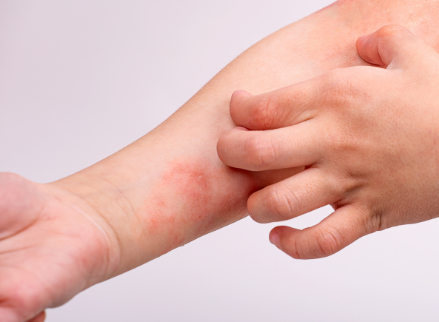Severe eczema linked to cardiovascular problems
Published 31 May 2018

Severe eczema in adults is associated with a moderately increased risk of cardiovascular problems.
This is the finding from a UK study published by The BMJ.
The study, the largest to date to assess the association between atopic eczema and major cardiovascular events, supports the consideration of targeted screening and focus on prevention strategies among these patients.
There is now growing evidence that people with severe chronic inflammatory diseases, such as rheumatoid arthritis and severe psoriasis, may be at higher risk of cardiovascular disease (CVD), independent of more traditional risk factors.
Previous studies on the risk of CVD in patients with atopic eczema have reported mixed results, but given how common it is, even a small increase in risk would be important from a public health perspective, the authors suggest.
The international research team led by Sinéad Langan at the London School of Hygiene and Tropical Medicine, set out to investigate whether adults with atopic eczema are at an increased risk of cardiovascular disease and whether the risk varies by eczema severity and activity over time.
They analysed data from the UK’s Clinical Practice Research Datalink for over 385,000 adults (average age 43 years) with atopic eczema, matched with up to five patients of similar age and sex, but without eczema.
Patients were classified as having mild, moderate or severe atopic eczema and were monitored for an average of five years.
During this time, major cardiovascular events were recorded - myocardial infarction, unstable angina, heart failure, atrial fibrillation, stroke and cardiovascular death.
After taking account of known cardiovascular risk factors, such as weight (BMI), smoking and alcohol intake, the researchers found that patients with severe eczema were at a 20% increased risk of stroke, 40% to 50% increased risk of unstable angina, myocardial infarction, atrial fibrillation, and cardiovascular death, and almost 70% increased risk of heart failure.
The risk was greater for patients with severe or more active eczema.
This is an observational study, so no firm conclusions can be drawn about cause and effect, and the authors outline some limitations, such as possible misclassification of eczema severity. Nevertheless, the study was large and the authors were able to account for other potentially influential risk factors.
As such, they conclude: “Severe and predominantly active atopic eczema are associated with an increased risk of cardiovascular outcomes. Targeting cardiovascular prevention strategies among these patients should be considered.”
In a linked editorial, John Ingram, consultant dermatologist at Cardiff University, says these results have helped to clarify the conflicting evidence regarding atopic eczema and cardiovascular (CV) risk, and make the case for targeted screening of standard cardiovascular disease risk factors.
The results may also have ramifications for allocation of healthcare resources in eczema, through use of expensive next generation biologic drugs to better control severe eczema, he adds. Exploring whether these eczema drugs reduce CV events in patients with severe eczema is the next important step, he concludes.
Onmedica

 Facebook
Facebook Twitter
Twitter



